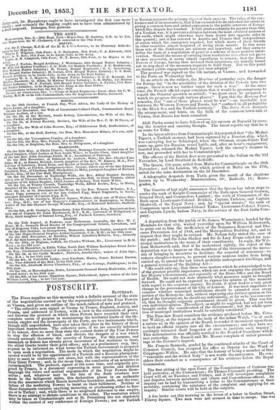POSTSCRIPT.
SATURDAY.
The Times supplies us this morning with a definite account of the state of the negotiations carried on by the representatives of the Four Powers .at Vienna, and gives an outline of the much-talked-of note and protocol. The Times supplies us this morning with a definite account of the state of the negotiations carried on by the representatives of the Four Powers .at Vienna, and gives an outline of the much-talked-of note and protocol. "The collective note signed at Vienna by France, England, Austria, and Prussia, and addressed to Turkey, -with a view to the restoration of peace, and likewise the protocol in which those Powers have recorded their Own complete union of purpose in maintaining the territorial limits of the Ot- toman empire and the sovereignty of the Porte, are two instruments which, though stall unpublished, have now taken their place in the history of these important transactions. The collective note, if we are correctly informed of its tenour, does no more than state the earnest desire of the Four Powers to stop the effusion of blood, and obviate the dangers of a war which already seriously threatens the security of Europe. For this purpose, and masmuch as Russia has already given assurances of her readiness to treat, the allied Courts tender their good offices; and, as a preliminary step, they request to be informed on what terms the Turkish Government is prepared to open such a negotiation. The mode in which the negotiation might be opened would be by the appointment of a Turkish and a Russian plenipoten- tiary to meet in conference, not alone, but with the representatives of the Paw Great Powers ; and, in the mean time, the conclusion of an armistice is recommended. The protocol, signed at the same time, and originally pro- posed by France, is a document expressing in more precise and detailed language the views and mutual engagements of the Four Powers them- selves ; and, whatever may be the fate of the fresh overture now made to the belligerent states, this declaration places in an authentic form the assurances which Russia herself has heretofore made, and the reso- lution of the mediating Powers to insist on their fulfilment. Neither of these documents contains anything menacing or overbearing either to Rua- e15 or to Turkey ; and, while there is no misplaced deference to one empire, there is no attempt to dictate conditions to the other. The resolution which May be taken at Constantinople and at St. Petersburg lies not absolutely within the control of any conference of Foreign Powers ; nor are Turkish or Russian interests the primary object of their anxiety. The value of the con- ference and of its measures is, that it has succeeded to an unlooked-for extent in giving a common form and united expression to the public interests of Europe which this dispute has touched. It will avert a calamity far greater than that of a Turkish war, if it prevents division between the most civilized nations of the earth, which might otherwise have been drawn into opposite sides in this quarrel; and it has restored to Austria and Prussia that independence of action which the emergency required, but which many of their friends in other countries almost despaired of seeing them assume. In this sense these acts of the Conference are salutary and important, and they serve.to define the basis of a negotiation of peace or a scheme of more positive inter- vention. Should the means of carrying these resolutions into effect not prove at once successful, it seems almost superfluous to remark, that the Great Powers of Europe, having thus declared their intentions, are morally bound net to stop short of the measures requisite to fulfil them. But on this point no distinct public engagements have yet been adopted."
The protocol was signed on the 5th instant, at Vienna ; and forwarded to the Porte on Wednesday last.
In an article on the subject, the Moniteur of yesterday says, the danger for Europe lay "in the possibility of the division of the Powers into two camps : there is now no further cause for such a fear." At the same time, the French official organ considers that it would be presumptuous to regard the Oriental question as settled; "we must even be prepared to watch its progress through various phases." Upon this the Morning Post remarks, that "one of those phases must be war"—an inevitable war between the Western Powers and Russia, but "confined in all probability to the Black Sea and the Turkish territory." The Daily News distrusts the arrangement, and hints, on the faith of the common town-talk at Vienna, that Russia has been consulted.
Abdi Pacha seems to have followed up his success at Bayazid by cross- ing the frontier and entering Georgia. The latest reports say that he is en route for Tiflis.
In the latest adviees from Constantinople it is reported that "the Medari Tigaret, a Turkish steamer, had been captured by a Russian ship, which was conveying her to Sebastopol, when the Ottoman steam-frigate Tail came up, gave the Russian vessel battle, and, after an hour's engagement, boarded her, released the Medari Tigaret, took the enemy's steamer in tow, and proceeded with her to Constantinople."
The officers of the British fleet were presented to the Sultan on the 22d November, by Lord Stratford de Redcliffe.
The Queen, 116 guns, sailed from Malta for Constantinople on the 26th November ; and the London, 90, which arrived at Malta on the 27th, sailed for the same destination on the 2d December.
A telegraphic despatch from Turin gives the result of the elections known up to Wednesday : Ministerialists, GO ; Radicals, 14; Retro- grades, 8,


































 Previous page
Previous page